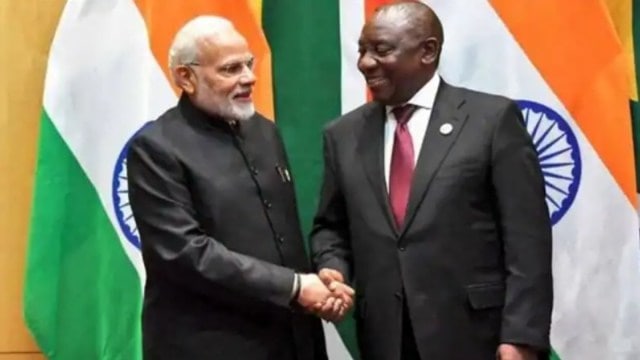
During her visit to Mauritius from March 11-13, President Droupadi Murmu described it as “a close maritime neighbour, a cherished partner in the Indian Ocean Region, and a key player in our Africa outreach”. The visit resulted in the inauguration of 14 community development projects and the laying of the foundation stone for a forensic science laboratory, all with Indian assistance.
While India works towards institutionalising the concept of the Global South, differing views exist regarding its effectiveness. Some view it as a force for change, advocating for a more inclusive global governance structure. Others critique it for oversimplifying a complex world order. Despite that, the term’s utility in the transition to multipolarity cannot be ignored. As India situates itself as one of the leading voices of the Global South, I argue that it needs to centre African countries in its engagement with the developing world.
The rationale for this extends beyond the oft-quoted data points: Africa’s significant growth rate of 3.8 per cent and its young population, with 60 per cent under the age of 25, estimated to reach 1.1 billion people by 2040.
As India navigates an evolving global landscape, a multifaceted relationship with Africa offers significant opportunities. First, the potential for economic partnerships is immense. Indian investments in Africa reached $98 billion in 2023, with trade totalling $100 billion. Forty-two African countries are the second-largest recipients of all credit extended by India. Around 200 developmental projects have been completed in the region. Indian social enterprises and NGOs are exporting low-cost, scalable solutions, from eco-friendly houses to rural women solar engineers.
Second, Africa’s influence in global forums will be important for India’s vision for global governance. As Global South houses three-fourths of humanity and over 39 per cent of the global GDP, there’s a call to reform existing structures towards a more inclusive system focused on development. New Delhi’s advocacy for the African Union in the G20 has found resonance.
An analysis of sustainable development cooperation presents two ideas — one sectoral and the other thematic — vital for Africa’s forthcoming decades of growth. Developing synergies in these areas aligns with India’s interests. The first is cooperation in the critical minerals sector. To build solar panels and batteries necessary for a low-carbon future, access to minerals classified as “critical”, “transition” or “green” is key. Africa, with 30 per cent of the world’s mineral reserves, is vital to power the energy transition. Given the geographical concentration of critical minerals, diversifying sources and fostering strategic partnerships with resource-rich nations are imperative for India’s growth and national security. As New Delhi prepares for what the International Energy Agency terms “the dawn of a new industrial age”, the convergence of India’s supply chain diversification and Africa’s desire to capture the value chain introduces avenues for cooperation.
The second is increasing technical capacity building amongst Africa’s workforces. In January, in the main assembly of the old African Union headquarters in Addis Ababa, I witnessed deliberations between the continent’s policymakers and leading thinkers. A topic raised regularly was the need to improve technical skills. Given India’s longstanding commitment to education and capacity building in Africa, New Delhi could revamp existing collaborations or establish new ones with African technical organisations. This endeavour would bolster negotiation skills, training in project management, and devising industry-specific technical courses. Indian research institutes engaging with Africa’s research community can facilitate the creation of solutions to address Global South challenges.
In this era of geopolitical competition and realignment, India’s multifaceted relationship with African nations is poised for a fundamental transformation. As India’s aspirations for the Global South take shape, leveraging historical partnerships with African countries remains imperative. To dispel any ambiguity, the testimony of a Punjabi farmer who relocated to Ethiopia to invest in agriculture resonates: “If you ask me why I moved, it’s obvious. Africa is the future.”
The writer is an Associate Fellow at the Centre for Social and Economic Progress (CSEP). Views expressed are personal